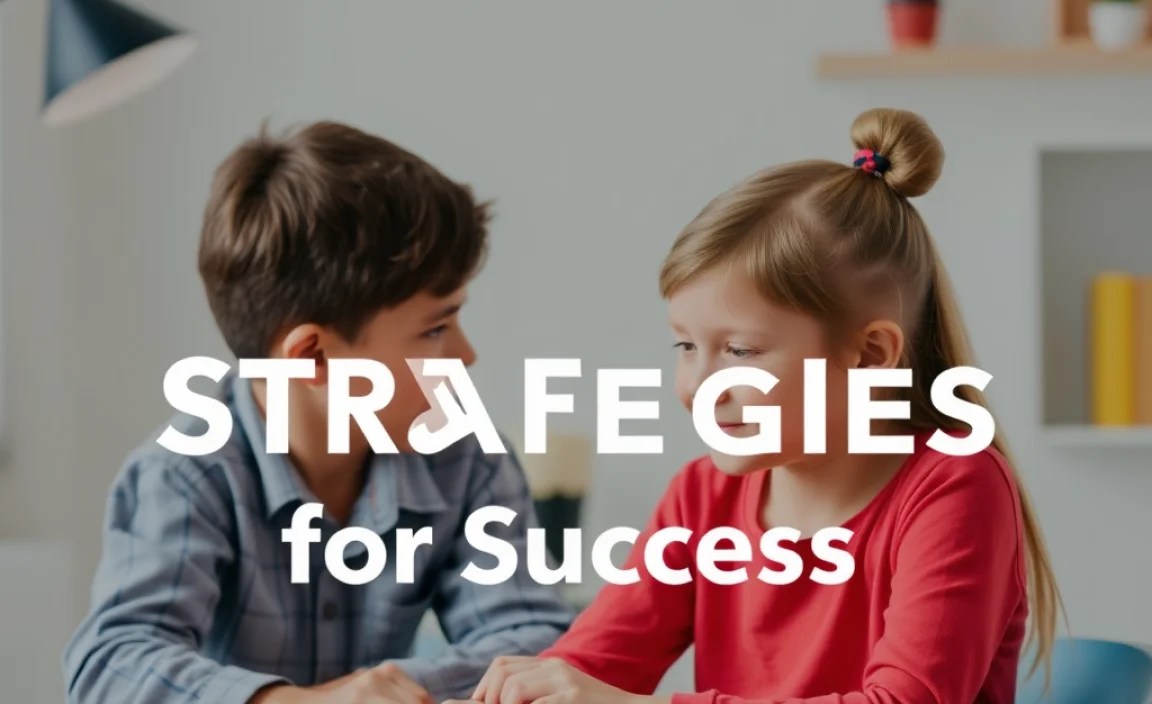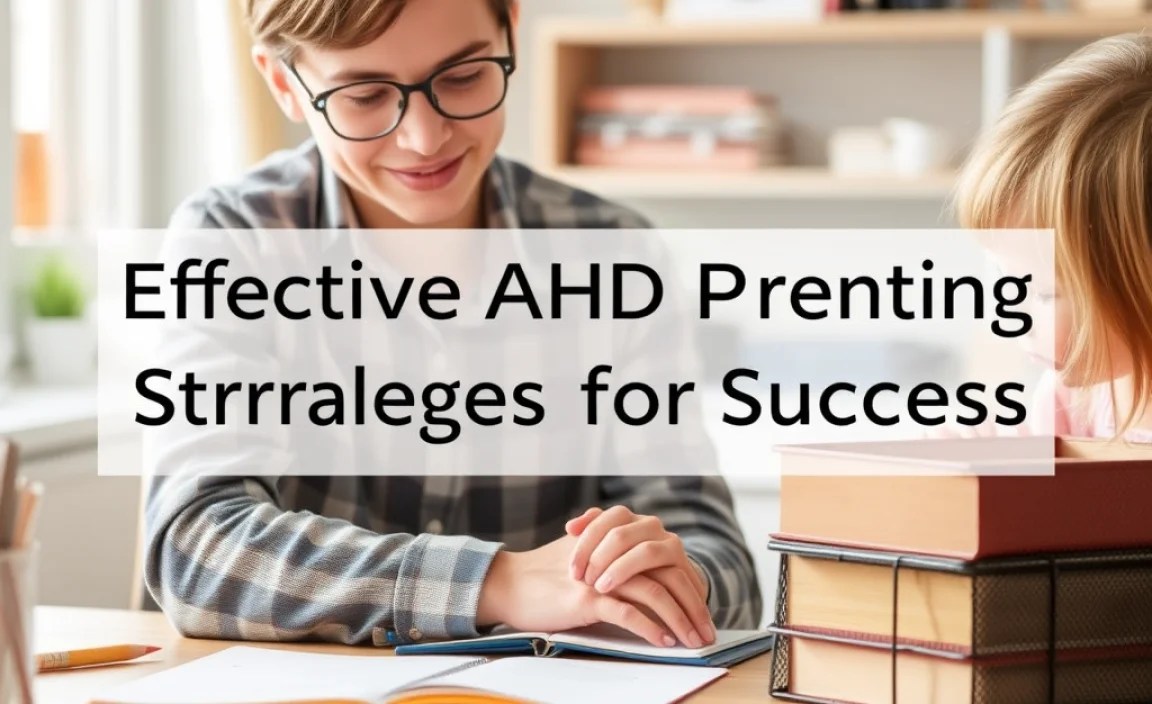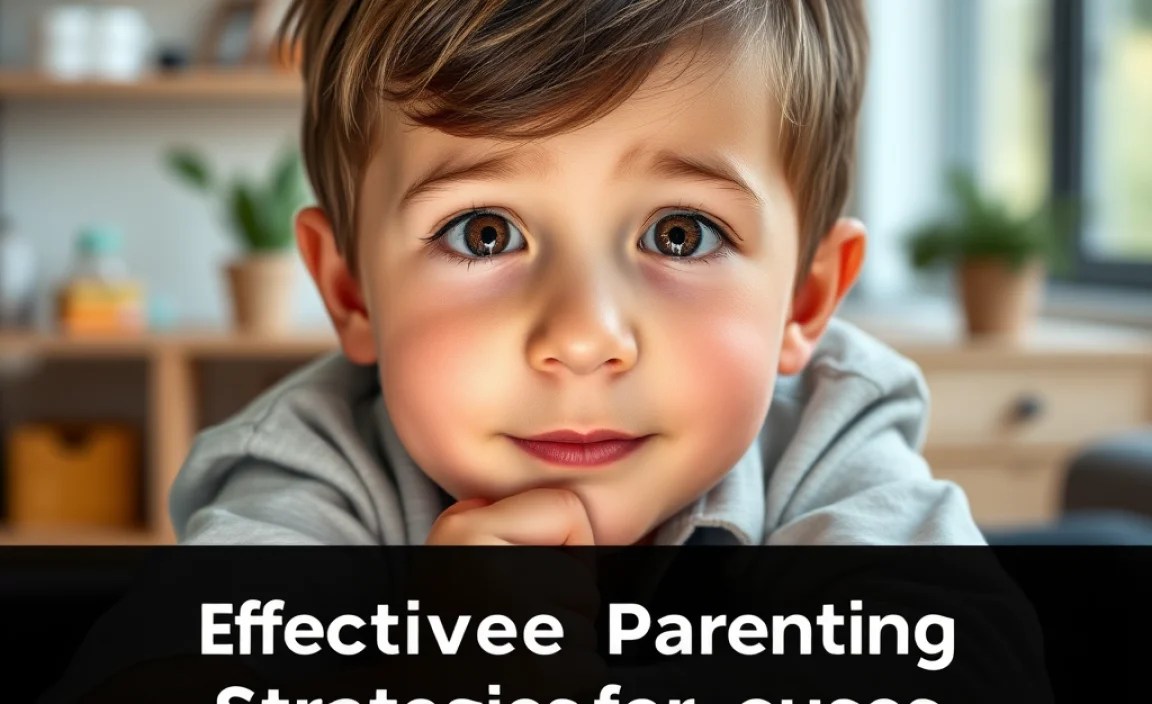Imagine trying to focus in a busy room. That’s what parenting with ADHD feels like. Parents with ADHD face unique challenges. But there are ways to manage it. By using simple strategies, life can become easier. Curious to learn more?
ADHD stands for Attention Deficit Hyperactivity Disorder. It makes focusing hard. Many adults live with ADHD. This includes some parents. Parenting with ADHD strategies can help those parents thrive. Let’s dive into some helpful tips.
At A Glance
Key Takeaways
- Understanding ADHD can make parenting easier.
- Plan daily tasks to stay organized.
- Use reminders to manage time better.
- Involve kids in creating fun routines.
- Parenting with ADHD strategies empower families.
Understanding ADHD Challenges

ADHD creates challenges for parents. It may cause forgetfulness and impulsivity. These can make parenting tricky. Imagine trying to pack lunches and forget what you need. That’s one example. So, how can parents with ADHD manage this? Understanding ADHD’s effects is the first step. Knowing what happens in the brain helps. It can lead to better strategies.
- ADHD affects attention and focus.
- It may cause impulsive actions.
- Memory challenges are common.
- Frustration can arise from distractions.
- Understanding helps find solutions.
- Acceptance aids in coping.
- Support networks are valuable.
Parents with ADHD need patience and understanding. Learning about ADHD can make daily life smoother. It can improve family relationships too. When parents know their brain better, they can find what works best. This knowledge helps them be creative with solutions.
Fun Fact or Stats : About 4% of adults have ADHD.
What Is ADHD?
ADHD is a condition that affects the brain. It makes focusing hard. Do you ever feel like your mind is racing? That’s how ADHD feels sometimes. People with ADHD may also act without thinking. They might forget things easily. Knowing this helps us understand their behavior better. Isn’t it interesting how our brains work differently?
Why Do Parents Need Strategies?
Parents with ADHD face unique challenges. Imagine trying to do a puzzle with missing pieces. Strategies help find the missing pieces. They make parenting easier. Strategies help keep track of tasks. They can also help manage time. Can you think of a time when a plan made things easier?
Why Acceptance Matters
Acceptance is important for parents with ADHD. It means understanding and embracing differences. Imagine if everyone understood each other perfectly. Wouldn’t that be nice? Accepting ADHD helps parents find peace. It helps them be kinder to themselves. Acceptance allows them to find joy in parenting. What if accepting ourselves made us stronger?
Staying Organized

Organization is key for parents with ADHD. It helps manage daily tasks. How do you keep track of your chores? Planning can make a big difference. Parents can use calendars, lists, and reminders. These tools help keep things on track. A little planning helps avoid chaos. Let’s explore some organization tips for parents.
- Use a calendar to plan activities.
- Make a checklist for daily tasks.
- Set reminders for important events.
- Keep items in designated spots.
- Declutter regularly to reduce distractions.
- Review plans weekly for adjustments.
Organizing isn’t just about being tidy. It’s about creating a routine that works. Parents can involve kids in the process. This makes it a family activity. Imagine the fun of planning a week together. Everyone knows what to expect. Organization brings peace to the household.
Fun Fact or Stats : Organized homes often reduce stress levels by 20%.
Using Calendars Effectively
Calendars are great for staying organized. They help track important dates. Have you tried using a calendar? It can remind you of birthdays and appointments. Parents with ADHD can use digital or paper calendars. They can set alerts to remember events. Calendars also help plan family activities. Isn’t it amazing how a simple tool can be so helpful?
Creating Checklists
Checklists are powerful for managing tasks. They help track daily chores. Have you ever made a list before? They ensure nothing gets overlooked. Parents can make lists for shopping, cleaning, or school tasks. Kids can help with checklists too. It teaches them responsibility. Isn’t it fun to check off items on a list?
Designating Spaces
Designated spaces help keep things orderly. They make finding items easier. How do you organize your things? Parents can keep keys in a specific spot. This avoids last-minute searches. Create a space for school supplies. It helps kids find what they need. Designated spaces save time and reduce stress. Isn’t it great when everything has a place?
Managing Time Well

Time management is crucial for ADHD parents. It helps balance responsibilities. How do you manage your time? Parents can set time limits for tasks. This avoids spending too long on one activity. Using timers can be helpful. They remind us when it’s time to switch tasks. Let’s discover more time management tips.
- Allocate specific times for tasks.
- Use timers to stay on track.
- Prioritize tasks by importance.
- Take regular breaks to recharge.
- Plan downtime for relaxation.
- Set boundaries to avoid burnout.
Managing time involves making smart choices. Parents can prioritize tasks based on importance. It helps focus on what matters most. Regular breaks are also important. They recharge energy and boost focus. Planning downtime helps prevent burnout. Time management leads to a balanced life.
Fun Fact or Stats : Using timers can increase productivity by 25%.
Setting Time Budgets
Time budgets help manage activities. They limit how long tasks take. Have you ever set a time limit? It can make chores feel like a race. Parents with ADHD can set time budgets for each task. This keeps the day moving smoothly. It also ensures time for fun and relaxation. Isn’t it interesting how planning can create more free time?
Taking Refreshing Breaks
Breaks are essential for staying focused. They help refresh the mind. Do you take breaks during your tasks? Short breaks prevent burnout. Parents can take breaks between chores. It helps them recharge. Breaks improve mood and energy. They make parenting more enjoyable. Isn’t it amazing how a short pause can make a big difference?
Balancing Work and Play
Balancing work with play is important. It keeps life enjoyable. How do you balance your day? Parents can mix chores with fun activities. This keeps kids happy too. Finding balance reduces stress. It makes parenting more joyful. Balancing responsibilities with play leads to happier families. Isn’t it great when everyone gets to have fun?
Building Fun Routines

Routines help keep life predictable. They make daily tasks easier. Do you follow a routine? Parents with ADHD can create fun routines. This turns chores into games. Kids can help plan routines too. It teaches them responsibility. Let’s see how to build engaging routines.
- Create morning and bedtime routines.
- Involve kids in planning activities.
- Use songs to make chores fun.
- Set regular family time for bonding.
- Allow flexibility for spontaneous fun.
- Reward kids for sticking to routines.
Routines don’t have to be boring. They can include fun activities. Parents can create morning and bedtime routines with songs. It makes tasks enjoyable. Regular family time is important. It strengthens family bonds. Flexible routines allow for spontaneous fun. Isn’t it wonderful when routines bring joy?
Fun Fact or Stats : Consistent routines can improve sleep by 30%.
Making Tasks a Game
Turning tasks into games makes them fun. Who doesn’t love a game? Parents with ADHD can make cleaning a race. It motivates kids to help. Games make chores exciting. They turn boring tasks into adventures. Isn’t it fun when work feels like play?
Involving Kids in Planning
Involving kids in planning boosts engagement. Do you let kids help plan? They feel important and responsible. Kids can suggest activities for routines. This makes them more willing to participate. Involving kids in planning fosters cooperation. It strengthens family bonds. Isn’t it nice when everyone feels included?
Rewarding Routine Success
Rewards encourage sticking to routines. Who doesn’t love a reward? Parents with ADHD can give small rewards for routine success. It encourages kids to follow routines. Rewards can be stickers or extra playtime. They motivate kids to keep trying. Isn’t it rewarding to celebrate success together?
Using Technology Wisely

Technology can help parents with ADHD. It offers tools for managing tasks. How do you use technology? Parents can set reminders on their phones. Apps help track tasks and schedules. Technology offers timers and alerts. Let’s explore how technology supports parenting.
- Use apps to track tasks and schedules.
- Set phone reminders for important events.
- Use digital calendars for planning.
- Find educational games for kids.
- Ensure screen time is balanced.
- Use timers for task management.
Technology can simplify parenting. Apps help remind parents of important events. Digital calendars aid in planning. Educational games make learning fun for kids. Technology offers many helpful tools. Isn’t it amazing how phones and apps can support parenting?
Fun Fact or Stats : 85% of adults use technology for reminders.
Tracking with Apps
Apps help track tasks and activities. Have you used an app for reminders? Parents with ADHD can find apps for task management. They help organize daily activities. Apps can also track kids’ schedules. They make parenting more manageable. Isn’t it cool when technology makes life easier?
Balancing Screen Time
Balancing screen time is important. How much screen time do you have? Parents with ADHD can set limits for screen use. It ensures time for other activities. Kids need balance between screens and play. Finding this balance is key. Isn’t it great when kids enjoy both learning and playing?
Using Educational Games
Educational games make learning fun. Do you like learning through games? Parents with ADHD can find games that teach skills. Kids enjoy learning with fun activities. Educational games boost knowledge and creativity. Isn’t learning more fun when it’s a game?
Seeking Support Networks
Support networks help parents with ADHD. They offer understanding and advice. Do you have a support group? Parents can join online forums and local meetings. Sharing experiences helps. It makes challenges feel less lonely. Let’s see how support networks help parenting.
- Join online forums for advice.
- Attend local support meetings.
- Share experiences with others.
- Find mentors for guidance.
- Seek professional help if needed.
- Encourage family involvement.
Support networks offer valuable resources. They connect parents with similar experiences. Mentors provide guidance and tips. Professional help is also available. Family involvement strengthens support. Isn’t it comforting to have a community that understands?
Fun Fact or Stats : Support groups can reduce stress by 50%.
Joining Online Communities
Online communities offer great support. Have you joined one before? Parents with ADHD can find forums and groups. They offer advice and share stories. Online communities provide comfort and understanding. Isn’t it amazing how people can connect from anywhere?
Finding Local Support
Local support groups offer face-to-face connections. Have you attended one? Parents with ADHD can find local meetings. They help build relationships with those nearby. Local support is personal and engaging. Isn’t it nice to have people who understand in your community?
Seeking Professional Advice
Professional advice offers expert guidance. Have you ever talked to a counselor? Parents with ADHD can seek professional help. It offers effective strategies for managing challenges. Professional advice is tailored to individual needs. Isn’t it great to have experts who can help?
Conclusion
Parenting with ADHD involves unique challenges. Using effective strategies makes it easier. Understanding, organizing, and managing time are key. Building routines and using technology help too. Support networks offer valuable guidance. With these tools, parents can thrive. Parenting with ADHD strategies empower families to foster happy, balanced lives.
FAQs
Question: What is ADHD?
Answer: ADHD stands for Attention Deficit Hyperactivity Disorder. It affects attention and focus. People with ADHD may find it hard to stay organized or remember tasks. Understanding ADHD helps in managing it effectively.
Question: How can parents with ADHD stay organized?
Answer: Parents with ADHD can use calendars, checklists, and reminders. These tools help keep track of tasks and events. Organizing daily activities reduces stress and chaos. It helps families run smoothly.
Question: Why are routines important for ADHD?
Answer: Routines offer structure and predictability. They help manage daily activities effectively. Parents with ADHD find routines reduce stress. Kids also benefit from routines as they learn responsibility. Fun routines make tasks enjoyable.
Question: How does technology assist ADHD parenting?
Answer: Technology offers tools like apps and digital calendars. These help parents with ADHD track tasks and schedules. Reminders keep important tasks on track. Educational games also make learning fun for kids. Technology simplifies parenting tasks.
Question: What support is available for parents with ADHD?
Answer: Support networks offer valuable help. Parents can join online forums and local groups. Sharing experiences aids in coping. Professional advice provides expert guidance. Family involvement also strengthens support. These networks empower parents with ADHD strategies.
Question: How can parents manage time effectively?
Answer: Time management involves setting priorities and limits. Parents with ADHD can use timers to stay on track. Regular breaks prevent burnout. Planning downtime allows relaxation. Effective time management leads to balanced, stress-free days.